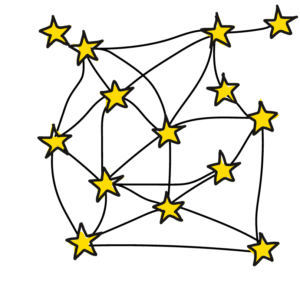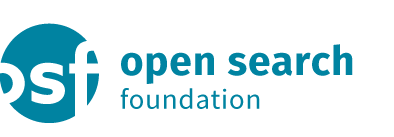Six third-party partners have joined the EU research project OpenWebSearch.EU. They are contributing new technical, legal and economic topics to the development of a European search infrastructure for the internet.
Starnberg, November 2023 – OpenWebSearch.EU has brought six third-party partners on board who were selected in an open call for proposals. With the major goal of realising a European Open Web Index (OWI), research studies on legal or economic aspects of open search were sought as well as concepts for legally compliant data collection or processing that also take social framework conditions into account.
The new third-party funding partners were selected from 21 submissions. The call for proposals was aimed in particular at small companies, innovators, researchers or research teams. They are intended to expand and enrich the existing R&D activities of the EU project. The selected partners will receive partial funding of between 25,000 and 120,000 euros each for their contributions.
Further open calls will follow in the first quarter of 2024. Successful third-party partners will be integrated into ongoing and future research and development activities for the Open Web Index.
OpenWebSearch.EU introduces the 6 third-party projects:
MRC – Market potential assessment for OpenWebSearch.eu: Quantifying benefits and costs of scaling EU web search
In charge of assessing the market potential of an Open Web Index, the Mücke Roth & Company team surrounding Dr. Daniel Nowakowski brings in their management consulting expertise to help evaluate both economic and non-economic aspects, including societal, cultural and environmental dimensions of the project.
Mücke Roth & Company are a Germany-based management consultancy with approximately 50 full-time professionals and over 70 independent industry experts.
More info about the MRC project
LISA – A legal framework for the development and operation of an Open Web Search Index (Legal, Intellectual Property and Cyber-Security Aspects)
The project aims at delivering tangible guidelines from a legal, social and security viewpoint. From this perspective, the project moves beyond frontiers, not only in a technological, but also a legal way.
Project owner Prof. Dr. Matthias Wendland, LL.M. (Harvard) is Professor of Information Technology Law at the University of Oldenburg in Germany and Head of the Digital Law Hub at the University of Graz in Austria.
More info about the LISA project
OPEN CONSOLE – Open Console Implementation
Regulation about copyrights, licenses, and abuse management require a sense of consent between data collectors and the data providers. Together, participants in Open Console improve the availability and quality of produced knowledge about websites, improving thus the trust of users that their data is processed carefully and according to their inputs.
“Open Console can be used to level the playfield: an alternative to Google’s Search Console is a module in the Open Console web-interface. You prove your identity and site ownership once, and all Search Engines can get the same configuration you entered.” says Mark Overmeer, of Markov Solutions – a Netherlands-based freelance business run by Mark Overmeer and Thao Phuong Nguyen.
More information about the Open Console project
LOREN – Legal Open European Web Index
The project LOREN seeks to provide a comprehensive analysis of the legal constraints and requirements for building and operating an OWI. It will give insights into the legal implications of crawling and data storage and sharing together with recommendations for an OWI that complies with European laws and regulations.
Project owners are Paul C. Johannes, a Germany-based attorney at law with a focus on IT law, and Dr. Maxi Nebel, research associate in provet at ITeG and managing partner at DRBG in Germany.
More information about the LOREN project
ALMASTIC – Assessing Legal Risks and Mitigating Challenges in Open Web Indexes
With the project ALMASTIC Prof. Dr. Kai Erenli (University of Applied Sciences BFI Vienna) aims to legally secure the Open Web Index by subjecting its technical aspects – collection, storage, distribution– to legal evaluation. The goal is to identify obstacles and mitigate legal risks in the process of global dissemination of the OWI.
More information about the ALMASTIC project
LAW4OSAI – License-Aware Web Crawling for Open Search AI
With the aim of enabling license-aware crawling of web content by automatically identifying and retrieving content licenses, Dr. Daniel Braun (University of Twente), Dr. Bernhard Waltl (Liquid Legal Institute, a Germany-based non-profit institution focusing on legal innovation) and Balthasar Cevc (fingolex, a Germany-based IT law firm) are joining forces under project LAW4OSAI. The project aims at enabling open web search filtered by licenses and, more importantly, the development of open large language models for next-generation search technology. This includes conversational search or image generation that respect the rights of authors and copyright.
More information about the LAW4OSAI project
About OpenWebSearch.eu
OpenWebSearch.EU is the first funding project by the EU to get tomorrow’s web search up and running. 14 renowned European research centres kicked-off the project in September 2022. Over the next three years, the researchers will develop the core of a European Open Web Index (OWI). In addition, they will set the foundation for an open and extensible European Open Web Search and Analysis Infrastructure (OWSAI), based on Europe’s values, legislation and standards. The project receives funding of 8,5 million Euros from the European Union’s Horizon research and innovation programme under grant agreement no. 101070014.
About Horizon Europe
Horizon Europe is the EU’s key funding programme for research and innovation. It aims to build a knowledge- and innovation-based society and a competitive economy while contributing to sustainable development. The programme aims at implementing the European Commission’s guidelines.
Social Media:
LinkedIn: https://www.linkedin.com/company/openwebsearch-eu
Mastodon: https://suma-ev.social/deck/@openwebsearcheu
Twitter/X: https://twitter.com/OpenWebSearchEU
“Does it always have to be Google or Bing? With the OpenWebSearch project, the EU wants to protect its sovereignty on the Internet. The goal is a freely accessible web directory that feeds diverse search engines and language models and should trigger a boom in new web services.
Arne Grävemeyer reports in the 9/2023 issue of c’t about the openwebsearch.eu project, in which the Open Search Foundation is significantly involved. The article takes a detailed look at the project, its background and future development. Michael Granitzer (University of Passau, OSF and project lead of openwebsearch.eu), Stefan Voigt (Open Search Foundation, DLR), Christian Gütl (Graz University of Technology) and Phil Höfer (SuMa e.V./MetaGer) have their say.
“But what could you do with a large web index if it were freely available to the public? One could build alternative search engines or specialised search services according to selected topics. Users would have free choice and could better protect their private user profiles. Linguists could use the data pool of a large web index to follow how our language is developing, and sociologists could observe how we interact with each other in the social media. Web services could use it to look for clues to incipient pandemics or other catastrophic events and thus build an early warning system.”
“We are not a European Google,” says Michael Granitzer, Chair of Data Science at the University of Passau, who is coordinating the OpenWebSearch project. He says the project is not about building a large search engine, but much more fundamentally about establishing an infrastructure that search engines and other services can later work with. Google’s size is certainly out of reach at the beginning. “It will be more like Wikipedia, which started with a small core compared to large publishers and then grew continuously.”
“Even at the start of the project, and thus before the hype around ChatGPT, the partners considered the Open Web Index, with its focus on European content and languages, as a data pool for specialised language models. New search engines could also immediately use these models as an interface for search queries. “Users are usually not looking for links, but for answers to their questions or even suggested solutions,” says Gütl. That speaks for the use of chatbots, he says.”
“In terms of Europe’s digital sovereignty, the Open Web Index can certainly be seen as a critical infrastructure. The project partners hope that it will create transparent structures on the web. The envisaged European web index promises more plurality and hopefully benefits above all those who simply provide the best and most reliable information on their websites.”
Online version of the article (paywall) at heise.de
Links to Open Web Search, compiled by c’t: ct.de/y6sw

Open Search Foundation e.V.
The Open Search Foundation e.V. is a European movement of people and organisations that work together to create the foundation for independent, free and self-determined access to information on the Internet. In cooperation with research institutions, computer centres and other partners, we’re committed to a searching the web in a way that benefits everyone. The promotion of research in the field of search engines, plus education and cooperation, form the pillars of our work.
